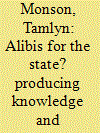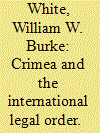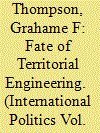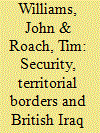| Srl | Item |
| 1 |
ID:
115037


|
|
|
|
|
| Publication |
2012.
|
| Summary/Abstract |
This paper examines the production of knowledge about the causes of the May 2008 attacks on foreign nationals in South Africa, embodied in state actors' recourse to discursive tropes of a 'third force' or mere 'criminality' in explaining the attacks. It explores the way in which this 'knowledge' reproduced statist notions of territory and power in the wake of a cataclysm that destabilised conventional notions of the congruence of nation, state and territory. The paper shows how official explanations of the attacks served both to camouflage the internal borders made visible by localised conflagrations and to reassert the state as the exclusive author of territorial borders.
|
|
|
|
|
|
|
|
|
|
|
|
|
|
|
|
| 2 |
ID:
132468


|
|
|
|
|
| Publication |
2014.
|
| Summary/Abstract |
Putin's exploitation of the tension between the principles of non-intervention and self-determination is in the tradition of great-power interaction with international law. But Russia's interpretation sets dangerous precedents.
Crimea is Russia's. The March 2014 referendum and Russia's subsequent annexation of Crimea are now events of history, even while the territorial borders and political future of the rest of Ukraine remain contested. Yet, as international attention has moved from Sevastopol to Kiev and more recent crises elsewhere, a key balance between two of the most fundamental principles of the post-Second World War international legal and political order remains at stake.
|
|
|
|
|
|
|
|
|
|
|
|
|
|
|
|
| 3 |
ID:
078483


|
|
|
|
|
| Publication |
2007.
|
| Summary/Abstract |
Does there exist a genuine threat to the continuation of a broadly liberal international (and domestic) order, driven by the re-emergence of religious and secular fundamentalisms? This article assesses this issue in the context of first the rise of territorial power and then its fate in a period of globalization and the revival of religious intolerance. The twin concepts of sovereign-power and bio-power are deployed to investigate the emergence of territorial engineering in the 17th century. A key feature of modern fundamentalisms is that they promote and trade on the deterritorialization of social, political, cultural and economic activity. It is argued that this is a manifestation of a new form of 'spirited martial power'. The risks associated with these developments should not be over-exaggerated but they exist nonetheless. If this is the case, the problem becomes one of how to re-territorialize the activities and disputes engendered by this reappearance and re-emergence of spirited martial power in the international system, with all its attendant links to religious fundamentalisms. Here the argument is that this requires a re-examination of the nature of international borders, and indeed a re-emphasis on their role, not just in respect to containing disorder and restoring the capacity for governance, but also as a way of re-configuring international toleration and of righting a wrong
|
|
|
|
|
|
|
|
|
|
|
|
|
|
|
|
| 4 |
ID:
071311


|
|
|
|
|
| Publication |
2006.
|
| Summary/Abstract |
This paper looks at the development of British government policy towards Iraq in the run up to and during the war of 2003 with particular focus on the territorial borders of Iraq. The paper argues that, in contrast to what we might expect from the perspective of classical geopolitics, the issue of the location of Iraq's borders was largely taken for granted by the UK government. The territorial integrity of Iraq was repeatedly asserted by British ministers, including the Prime Minister, Tony Blair. However, the paper suggests that this disguises an important and potentially significant challenge to the role that territorial borders played in the Iraq crisis and conflict, and this is connected to wider changes in thinking about territorial borders in international politics that have characterised the Labour government's foreign policy thinking. This challenge sees territorial borders' significance more in terms of the nature of the regime they help to delimit than the geopolitical significance of their location. Also, the respect to be given to those borders is significantly influenced by the willingness and ability of that regime to contribute to dominant political and politico-economic agendas, including democracy, human rights, counter-terrorism and economic liberalisation. It is argued that policy towards Iraq demonstrates effectively this distinctive approach developed by the UK government, and points to weaknesses as well as strengths of adopting such a position on one of the most important institutions of the international system.
|
|
|
|
|
|
|
|
|
|
|
|
|
|
|
|